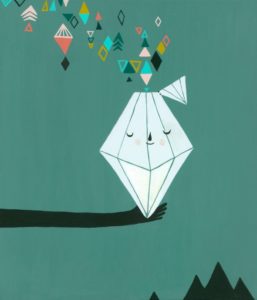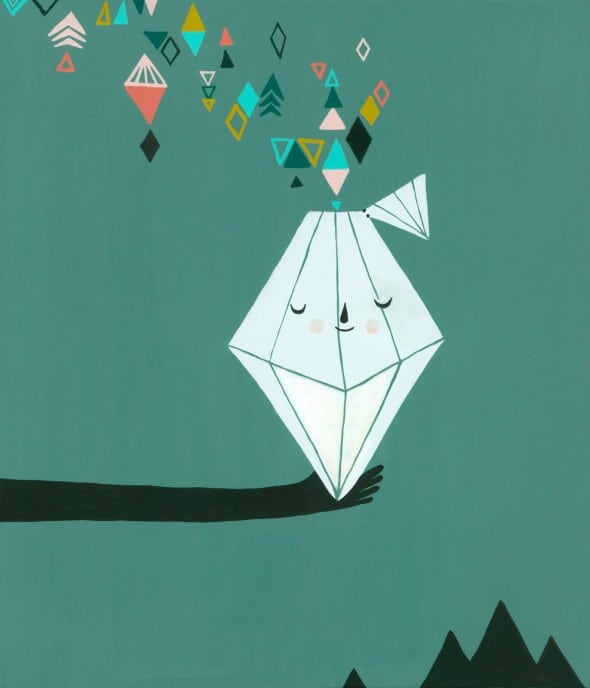
Art by Laura Berger
COVID-19, has confronted us all with a situation that is both unknown and uncertain. The virus has found a way into our lives, unprecedented and unannounced. It has controlled and determined how we live it. It is difficult to gather hope and certainty in these times. Even with our exposure and access to technology, the absence of human touch and presence has been felt by us all. It is a challenge to feel connected emotionally.
A friend of mine recently shared a post from the book, “Finding Yourself in the Kitchen” by Dona Veldon, which filled my heart with joy and hope. It read-
“The other day it occurred to me that all the delicious things in life — bread, cheese, wine, beer, pickles, kraut, just-cooked meats — become more delicious because of rest, because built into their process is a time where they sit quietly and do nothing. Actually, that’s not quite true. They are doing something: yeasts are eating sugars and burping carbon dioxide, juices are being absorbed, fermentation is being initiated, etc. But from the point of view of the cook, we are leaving it alone. We are taking our hands off of the process and allowing the wild and uncontrolled elements to take their turn.”
I took this metaphor in, absorbed it, and felt reassured. Practicing as a therapist attunes me to our inner world. That makes “leaving it alone”, daunting and even threatening. Being with oneself, while feeling in sync and connected with ourselves, is a luxury and privilege many of us are unable to afford, let alone enjoy and feel one with. Especially, in times of a crisis where reliance on human contact and interdependence is what takes us through.
Our regular lives have been forced to a halt. Restricted to the confines of our homes, there are threats to basic supplies of food and amenities even in metropolitan cities. What is normal, now calls for consideration.
From a psychoanalytical perspective, COVID-19, can be seen as a representation of the ways our psyches exist and develop while interacting with the outside world. It has unearthed our most primitive fears around survival and death. It has replaced our sense of safety, and comfort with an eerie sense of anxiety. One can expect to feel a range of emotions; fear, anxiety, anger, frustration, helplessness, lack of control, loneliness, denial and paranoia to name a few.
For many, the privacy of our inner worlds has found a home in the external reality. The chaos, confusion, and fear that now exists for all, binds us together as a universal race. For some, quarantine amidst fear, makes meaning-making of this intimidating experience rather isolating. There is a sense of loneliness and unwanted-ness, which is hard to fathom or even put to words. For many, it might be the first time coming in contact with their most primitive fears.
Fear has an interesting way of bringing us together, yet isolating us at the same time. In the current situation, it has challenged our basic trust, reliance, and safety. It has unearthed many anxieties we might have about intimacy and how we experience closeness.
However at the other end, there is a new fear stemming from stigma. Of who we are, if not just carriers of the virus. Most of us are consumed with the question- “Are we a threat to our elders and young ones?” Our contagion precedes us in the face of the unknown. For those who have been infected and for those in preventive isolation, there may further be feelings of guilt and turmoil about being contractors and then carriers. They are predisposed to becoming takers of others’ projections, and involuntary participants to people’s fears. There is the possibility of being subjected to the ultimate indignity- being viewed as the problem, the virus, the one who needs to be kept away. Unfortunately, as is the nature of stigma- the anger and misfortune of the stigmatized, hardly ever receives a space to be heard.
The indiscriminate nature of the virus makes us all equally susceptible and equally liable. While no one actively chooses to be a carrier or wishes to infect another, the likelihood of fatality may exacerbate one’s fears and distance from one another. It has brought us in touch with uncomfortable feelings of hostility and persecution towards anyone who could potentially harm us, which at the moment is any or all of us.
The question remains as to how to stay compassionate and kind, in the face of the unknown, and the potential threat we might be to each other. This while battling with some deep-seated fears of life and death, of being unwanted in the current situation. In these trying times, our long-standing version of normalcy has been interrupted. We are faced with a challenge of being halted and may be forced to rest, like the bread dough being set aside or “left alone”. Velden concludes, “…..teach (es) us that so much magic happens when we stop and rest. Flavor and depth develop, texture, medicine, nuance, transformation. For people, this is the time when we integrate all the experiences, all the input we’ve taken in throughout the day. Rest is the time when we sift through and digest and transform.”
There is no prescription or instruction to idealize this dictum. We know that the answer is not simple, for it has deep roots in our own approaches to life, living and conditioning as beings. Our current situation, however, might press upon a revaluation. These times are alerting us and urging us to look at things – time, relationships, space, intimacy, our ideas about life and death, safety and necessities, our very being- differently. And to feel less overthrown by it.
For some, returning to the old normal might seem like a potential challenge, for something might have been set in transformation. For others, something might have just halted and we are waiting to begin again. These are difficult times where perhaps we all have more questions than answers, in an enforced, shared, universal test.
As in the metaphor of the kneaded dough; in this period of interlude, we can hope to accommodate potential threats as potential possibilities. View it as one way to negotiate these uncertain tides. We all might feel ill-equipped in this struggle to stay afloat, but perhaps acknowledging this, is akin to giving ourselves a chance to re-examine what becomes crippling, and what helps sustain our living- physically and mentally- in the face of uncertainties.
About the author –

Rashi Kapoor is a Psychoanalytic Psychotherapist. She is currently training in Psychoanalysis with the Delhi chapter of the Indian Psychoanalytic Society. She is a Consultant Psychoanalytic Psychotherapist with Fortis Healthcare, New Delhi. She works across different age groups with people experiencing emotional conflicts, psychotic breakdowns and difficult states of mind.

